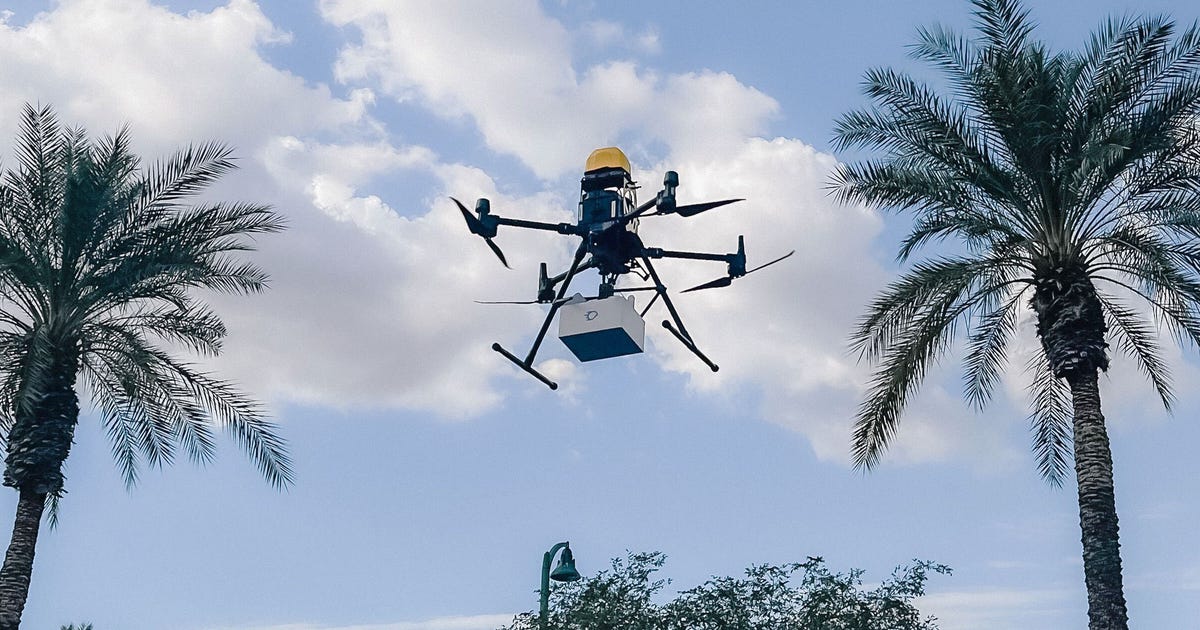
Drone delivery is maturing as tech giants like Alphabet’s Wing and Amazon Prime Air expand and startups reach scale, too. Zipline has completed more than 500,000 deliveries since 2016, Flytrex hit 21,350 deliveries in 2022, and Manna Drone Delivery is expanding to the US.
A small startup named Flyby Robotics thinks there’s room for improvement, though. Its approach relies on smaller, lighter drones with a shorter delivery range but lower costs.
“Everybody’s got to eat three times a day. We all love our Chipotle, our McDonald’s, our Chick-fil-A,” said co-founder and Chief Executive Jason Lu. “We can do that today. It’s economical. You don’t need a drone that costs as much as a Lamborghini to move your burgers.”
Flyby, a 10-person Los Angeles-based company that said Wednesday it has raised an initial $4 million in funding, is part of a fleet of companies hoping to revolutionize the delivery business. If they succeed you could receive your medicine, groceries, school supplies, power tools and coffee from the air instead of a traditional delivery vehicle.
There are plenty of obstacles. The technical challenges include designing aircraft that withstand bad weather, fly at night, find package pickup and drop-off spots, and avoid power lines. But drone delivery companies also need to clear regulatory hurdles, ensure safety and convince neighborhoods that the mini aircraft are worth the noise and privacy.
Flyby is using third-party drones but plans to eventually build its own, a common practice among drone delivery startups. It designed its own system for location monitoring, and a winch that weighs less than a pound, designed to lower food 100 to 150 feet to the customer. Keeping drones high, an approach that Wing and Zipline also use, means drones are quieter — comparable to the sound of people in conversation, operations chief Cat Orman says.
Flyby execs are aware of the policy constraints; in fact, Lu met Orman, his co-founder, in a drone policy class at Yale. With smaller drones and a delivery range of 2 to 3 miles, they hope to operate under proposed FAA Part 108 regulations with self-piloting drones and ground stations that monitor the local airspace, Lu said.
And they’ve got some allies. Flyby’s one-month pilot test, using a single drone costing about $8,000, delivered Nekter Juice Bar smoothies, MAD Greens salads and Tokyo Joe’s sushi to residents of Mesa, Arizona, for a $3 fee. Customers ordered through the retailers’ apps, and employees loaded food from a launch site set up in two parking places.
“Over the course of the pilot, we’ve learned that delivering food directly to our nearby guests without a car or a delivery driver is possible,” said Nick D’Antonio, vice president of IT at Salad Collective. “It was fun to watch our team and guests light up as they watched orders taking off from the launch pad or being delivered from the sky to their homes.”
Next on the company’s to-do list is better autonomous navigation technology for the drones and a bigger delivery test.
